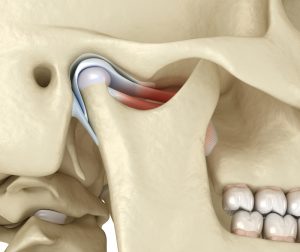Can TMJ Cause Your Teeth to Hurt?

Toothaches, jaw pain, and migraines — these excruciating experiences are common symptoms of temporomandibular joint disorder (TMJ). TMJ is a relatively common condition, and while it’s often associated with jaw issues, it can also cause tooth pain. In this article, we’ll explore causes, symptoms, and treatment options and answer the question: Can TMJ cause your teeth to hurt?
What is TMJ?
TMJ is a condition that affects the joint connecting your jawbone to your skull, called the temporomandibular joint. It’s responsible for movements like chewing, talking, and yawning. TMJ can cause pain and discomfort in the jaw, face, neck, and ears and difficulties opening and closing your mouth.
Causes of TMJ
This condition can occur for various reasons, including:
- Trauma or injury: A hard hit to the jaw or face, whiplash, or any other forceful impact can affect the joint.
- Teeth grinding or clenching. This common habit puts pressure on the jaw and can lead to TMJ over time.
- Misaligned bite: This can stress the jaw joint and cause TMJ.
- Stress: Emotional and physical stress can cause jaw muscle tension and trigger TMJ.
Keep in mind that while these factors can cause TMJ, it doesn’t mean that everyone who experiences them will develop the condition.
Symptoms of TMJ
The symptoms of TMJ can vary from person to person. In general, here are some indicators to pay attention to:
- Pain in the jaw joint, face, neck, or shoulders.
- Difficulty opening your mouth wide or feeling like your jaw is “locked.”
- Clicking or popping sounds when you open or close your mouth.
- Discomfort when chewing or speaking.
- Earaches or ringing in the ears.
- Headaches or migraines.
- Tooth pain.
Does TMJ Cause Tooth Pain?
TMJ can cause tooth pain. In fact, this is one of the most common symptoms. This occurs because the jaw joint is located close to your teeth roots — any inflammation or damage to this area can put pressure on the teeth and cause pain.
Additionally, people with TMJ may grind or clench their teeth, which can cause tooth pain, sensitivity and make you more susceptible to tooth decay.
Treatment options for TMJ
Thankfully, there are several effective treatment options for TMJ. These include:
- Diet changes: Avoiding hard or chewy foods, including gum, can help release tension. Instead, opt for soft foods.
- Lifestyle and habit changes: For example, chewing on both sides of your mouth, avoiding nail-biting, and intentionally trying not to grind or clench your teeth.
- Mouthguards: You can wear a mouthguard or nightguard as needed to prevent grinding.
- Dental treatments: Orthodontic treatments or other dental procedures, like braces, can correct misaligned teeth or bite problems contributing to your TMJ.
- Physical therapy: Jaw-stretching and strengthening exercises can help alleviate pain and improve the range of motion in this joint over time. Physical therapy often complements TENS (Transcutaneous Electrical Neural Stimulation) therapy to help relax your muscles.
TMJ vs. Toothache
It’s often difficult to distinguish between TMJ and toothache because they can have similar symptoms. However, there are some key differences:
- TMJ pain is usually centred around the jaw joint and may come with other symptoms, like clicking, difficulty opening your mouth, or earaches.
- Toothache pain is usually localized to a specific tooth or area of the mouth and may include symptoms like sensitivity, swelling, and fever.
If you’re experiencing pain or discomfort in your jaw or teeth, it’s essential to seek professional advice from your dentist to determine the underlying cause of your symptoms.
Professional TMJ Treatment
At Yazdani Family Dentistry, our experienced team is dedicated to helping you achieve optimal oral health and overall well-being. If you suspect you have TMJ or are experiencing tooth pain, visit us at one of our clinics today.










